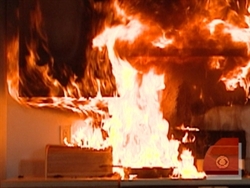1. Why Do We Need Kitchen Exhaust Cleaning?
Kitchen exhaust cleaning (often referred to as hood cleaning) is the process of removing grease that has accumulated inside the ducts, hoods, fans and vents of exhaust systems of commercial kitchens. Left uncleaned, kitchen exhaust systems eventually accumulate enough grease to become extreme fire hazards. Exhaust systems must be inspected regularly, at intervals consistent with usage, to determine whether or not cleaning needed before a dangerous amount of grease has accumulated
2. Top Benefits of HVAC Cleaning
Why should you have your HVAC system cleaned? The short answer is simple: because they get dirty over time and they have the potential to contain large amounts of dust and particulates.
Energy Savings
According to the U.S. Department of Energy, 25 to 40 percent of the energy used for heating or cooling is wasted. Contaminants in the heating and cooling system cause it to work harder and shorten the life of your system. Although filters are used, the heating and cooling system still gets dirty through normal use. When an HVAC system is clean, it doesn’t have to work as hard to maintain the temperature you desire. As a result, less energy is used, leading to improved cost-effectiveness.
Indoor Air Quality
Indoor air quality is one concern that building managers and building inhabitants have when they decide to investigate HVAC system. Through normal occupation in a building, we generate a great deal of contaminants and air pollutants, such as dander, dust, and chemicals. These contaminants are pulled into the HVAC system and re-circulated 5 to 7 times per day, on average. Over time, this re-circulation causes a build-up of contaminants in the ductwork.
While a contaminated HVAC system doesn't necessarily mean unhealthy air, the situation may be contributing to larger health issues or harboring contaminants that could cause serious problems for people with respiratory health conditions, autoimmune disorders or some environmental allergies.
3. The Importance of Water Tank Cleaning “Water is the passage way for infectious diseases.” The chlorine that is waited for a long time in water loses its effectiveness, which creates suitable environment for microorganisms. As a result of the water tanks not being cleaned or disinfected for a long time, the physical, chemical and the biological contaminants result in mudding, shedding, rusting, color, odor and bacteria formation in the water. This situation destroys the potableness and the usability properties of the water. Even if we don’t drink the water in the depots, the microbes in the water still enter our body by the washing of fruits and vegetables, using it in the bathroom and the toilette, brushing our teeth and washing of dishes and laundry, resulting in the formation of typhoid, typhus, dysentery, cholera and diseases such as hepatitis in our body. Additionally, the sand and rust particles in water tanks damage our hydrophore, purifier, laundry and dishwashing machines. In the water tanks that are not periodically cleaned, rodents, dead pests, worms, maggots, and plates of mud, rust and fungi form. The only way to avoid this is to disinfestation and cleaning of the water tanks with special chemicals and high pressure machines produced for tanks periodically at least once a year by the trained professionals. Unhealthy water is listed in the sixth place in the reports of “World Health Organization” for the cause of death right after cigarettes and alcohol. When we regard water not just as drinking water but also a means for cleaning, we can see the direct relationship of the cleaning of water tank at everywhere we live with our health.- Product Details
- Brand :
- Place of Origin : UAE
- FOB Price : On Request
- Minimum Order Quantity : Not Given
- Supply Ability :
- Packaging & Delivery
- Packaging Detail : Not Given
- Delivery Detail : Not Given




